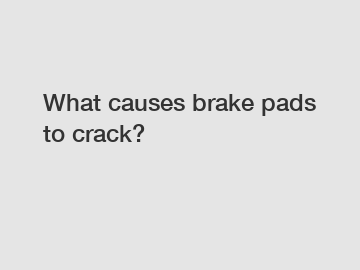Jan. 03, 2024
Transportation
What Causes Brake Pads to Crack?
Brake pads are an essential component of a vehicle's braking system, responsible for bringing the vehicle to a stop by creating friction against the brake disc or rotor. However, just like any other part of the car, brake pads are subject to wear and tear. One common issue that can occur is the cracking of brake pads. This article will discuss the potential causes of brake pad cracking and how it can be prevented.
Normal Wear and Tear.

One of the primary reasons brake pads crack is due to normal wear and tear. Over time, as the brake pads are exposed to heat and pressure, they begin to deteriorate. The constant friction and heat generated during braking can cause the brake pads to develop cracks. As the cracks deepen, the structural integrity of the brake pads weakens, compromising their performance and safety.
Excessive Heat.
Excessive heat is another significant factor that can contribute to the cracking of brake pads. When a vehicle is subjected to prolonged and intense braking, such as descending steep hills or hauling heavy loads, the brakes generate more heat than usual. If the heat is not properly dissipated, it can cause the brake pads to overheat and eventually crack. This is especially common in poorly ventilated brake systems or those with worn-out brake linings.
Low-Quality Brake Pads.
Using low-quality brake pads can also increase the likelihood of cracking. Inferior brake pads may not be manufactured to the same standards as high-quality pads and are more prone to cracking under stress. It is crucial to invest in reliable brake pads made from quality materials to ensure optimal performance and durability. .
Improper Installation.
Improper installation of brake pads is another potential cause of cracking. Brake pads must be installed correctly, ensuring proper alignment and engagement with the brake disc. If the installation is not done accurately, it can lead to uneven or excessive pressure on the brake pads, resulting in cracking. It is advisable to have brake pads installed by a professional mechanic to avoid any installation errors.
Environmental Factors.
Environmental factors can also play a role in the cracking of brake pads. Cold temperatures can make brake pads more brittle, increasing the risk of cracking. In regions with extreme weather conditions, such as severe winters, brake pads can be more susceptible to cracking. Additionally, exposure to moisture, chemicals, or debris on the road can accelerate the deterioration of brake pads, potentially leading to cracking.
Preventing Brake Pad Cracking.
While it may not be possible to completely avoid brake pad cracking, there are steps that can be taken to mitigate the risk. Regular maintenance and inspection of the braking system are essential. This includes checking the brake pads for signs of wear and tear and replacing them before they become severely cracked. Using high-quality brake pads and having them installed correctly is crucial. Additionally, avoiding excessive and prolonged braking can help prevent overheating and potential cracking.
In conclusion, brake pad cracking can occur due to normal wear and tear, excessive heat, low-quality pads, improper installation, and environmental factors. Regular maintenance, using high-quality pads, and proper installation are essential in preventing brake pad cracking. If you notice any signs of cracking or deterioration in your brake pads, it is crucial to get them inspected and replaced by a professional mechanic. For any further inquiries or assistance regarding brake pad issues, please do not hesitate to contact us.
For more information, please visit BMW Ceramic Brake Pads China Company, Rear Axle low-metallic brake pad, Asian Vehicles Brake Pad Manufacturer.
Previous: What are the different types of LNG storage systems?
Next: LNG Transportation Equipment Explained: Solutions to Safely Transport Liquefied Natural Gas
If you are interested in sending in a Guest Blogger Submission,welcome to write for us!
All Comments ( 0 )